I Tried 11 Store-Bought Burger Buns & the Best Was Sweet and Buttery
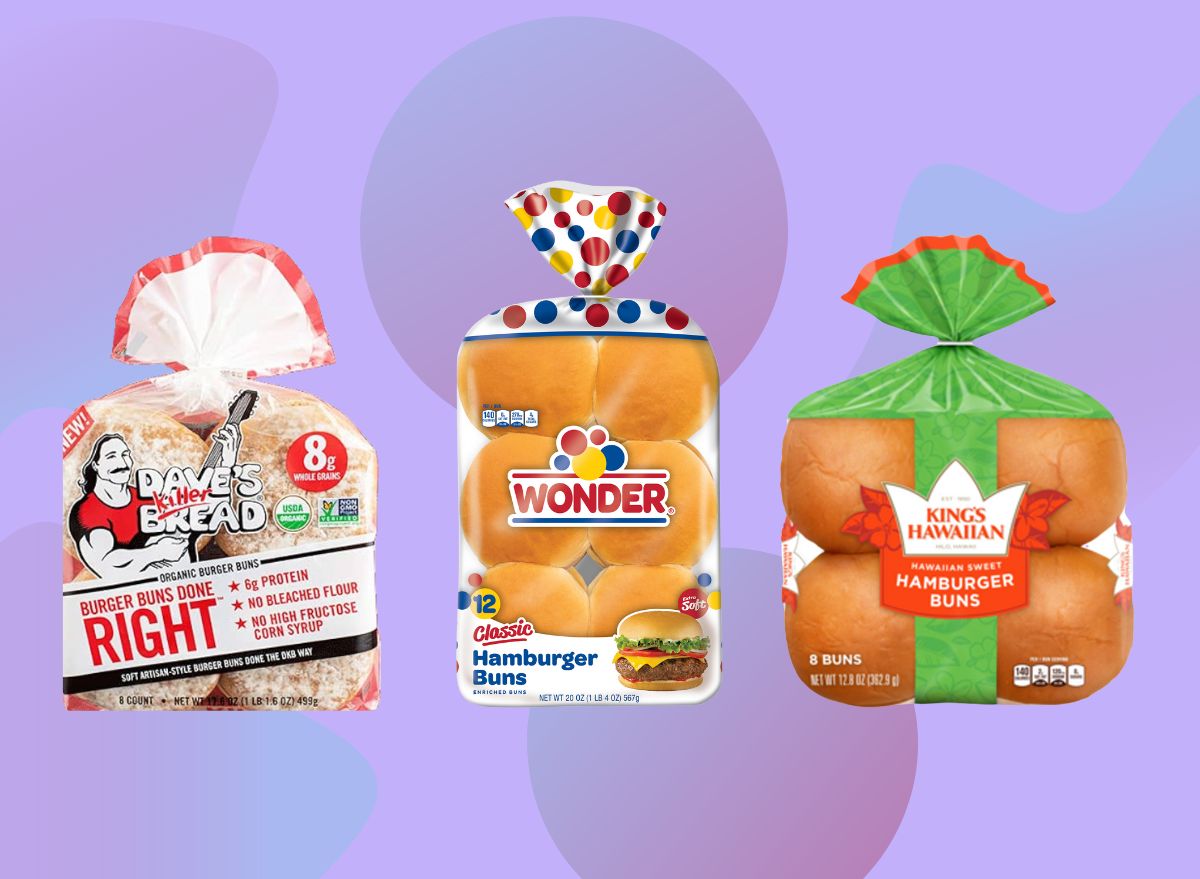
The bread aisle always gives me pause. The overwhelming number of options seems to cloud my judgment, and since I haven't picked up any brand loyalty in this department, I often end up with the cheapest bag of bread, rolls, or buns I can find—a decision I inevitably regret later. There are certainly better ways to judge bread at face value!
But to truly remedy this, I decided to go a step further and find out which purchases are least likely to end in buyer's remorse. And, with summer cookouts coming up, what better place to start than with hamburger buns?
Now, you can sit there and say that a bun isn't nearly as important as what's inside. Or that it's really just a vessel for getting top-notch beef patties and other ingredients into your mouth. But a bun really does have the power to make or break your entire hamburger or sandwich–something I've experienced firsthand with a couple of weak generic store brand choices.
You need a bun that is soft but doesn't fall apart. One that is buttery and flavorful but not to the point of completely overtaking the experience. These are the characteristics I looked for as I tasted my way through 11 different bags. Read on to find out which bun I deemed best and which options failed to meet my standards—ranked from my least favorite to the one I'll be stocking for all my summer barbecues.
Schwebel's Hamburger Buns
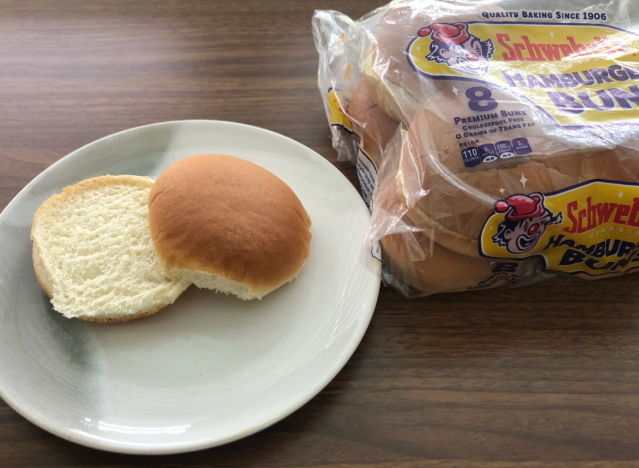
Calories: 110
Fat: 1.5 g (Saturated Fat: 0 g)
Sodium: 200 mg
Carbs: 21 g (Fiber: 1 g, Sugar: 3 g)
Protein: 4 g
Hailing from my home state of Ohio, we have classic hamburger buns from Schwebel's. The company has been in the bread business since 1906, diversifying over the years to now offer everything from white and wheat loaves to bagels and flatbreads. Quality and innovation are two of the regional brand's pillars, so I was eager to see how it stacks up against some of the country's biggest names. I bought an 8-pack of hamburger buns–or sandwich buns as I've also seen them called–for $3.49 at my local Kroger.
The look: Smooth on top, on the small side, and fairly basic. Its dry appearance doesn't inspire much confidence, not to mention the creepy clown on the packaging. He supposedly came to life in 1932 to serve as an uplifting symbol during the Great Depression. For me though, he's more unnerving than uplifting.
The taste: It lacks moisture and any defining flavor–almost like it had been sitting on the shelf for a day or so and was beyond its peak freshness. It's not overly yeasty or doughy, just a neutral vessel for a plump burger. I will say, though, it does hold its own against the meat and actually benefits from some of the juices. So, at least Schwebel's has this firmness and reliability going for it. Still, it was my least favorite of the bunch.
Nickles Cuntry-Style Honey Buns
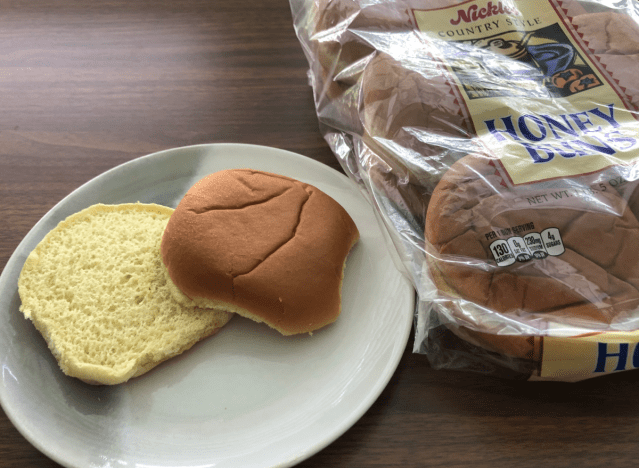
Calories: 130
Fat: 2 g (Saturated Fat: 0 g)
Sodium: 230 mg
Carbs: 25 g (Fiber: 1 g, Sugar: 4 g)
Protein: 4 g
Nickles–not to be confused with a 5-cent coin–is a bakery that operates predominantly in the Midwest. Similar to Schwebel's, the brand has been slinging bread, buns, and rolls for over a century (since 1909, to be exact). But, the company additionally dabbles in sweeter baked goods such as its mini Donut Fair donuts–which I can confirm are finger-licking good. I decided to give the Nickles Country-Style Honey Buns a whirl among its wide selection of buns. An unusually large bag of 12 rather than 8 cost me $3.79.
The look: More yellow than white on the inside. The exterior is well-browned but not overdone. It does have a couple of creases, though, presumably from being lightly squished in its clear plastic bag.
The taste: With a name like honey buns, I expected an obvious dose of sweetness–possibly a subconscious association with the cloying treats from Little Debbie–but it never came. Instead, this bun reminded me of an unflavored yeast donut. I can appreciate its thick and chewy texture. Without more of a welcoming and satisfying taste, though, it falls behind in the rankings.
Sara Lee Artesano Brioche Buns
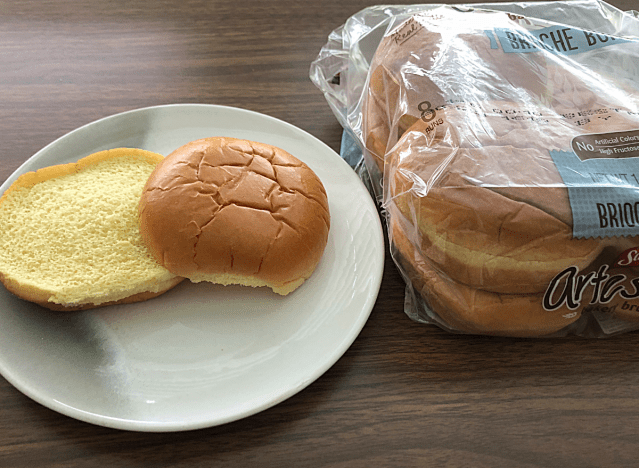
Calories: 220
Fat: 3 g (Saturated Fat: 1 g)
Sodium: 310 mg
Carbs: 25 g (Fiber: 1 g, Sugar: 6 g)
Protein: 7 g
The red ribbon of the Sara Lee brand can be seen throughout the frozen dessert aisle–hello cheesecake and chocolate creme pie–and in the grocery store's bakery section. When it comes to bread, Sara is no slouch. The company churns out option after doughy option and recently has also delved into the world of more gourmet bakeshop items under its Artesano line. Within this specialty group is where I found a pack of brioche-style burger buns priced at $3.99.
The look: A golden color similar to Nickles. It looks better assembled here, though, with tighter air pockets and a rotund top that is virtually glistening.
The taste: I had high hopes for these French-inspired brioche buns. But, they proved to be more appealing to the eyes than the taste buds. Like Nickles, they reminded me of flavorless donuts with plenty of dry yeast flavor. What struck me the most, though, is the almost musky flavor accompanying each bite. It seems to lessen in intensity when paired with a burger patty but continues to leave you with a bitter aftertaste all the same. To make matters worse, the buns are also far from the sturdiest on the shelf.
Ball Park Hamburger Buns
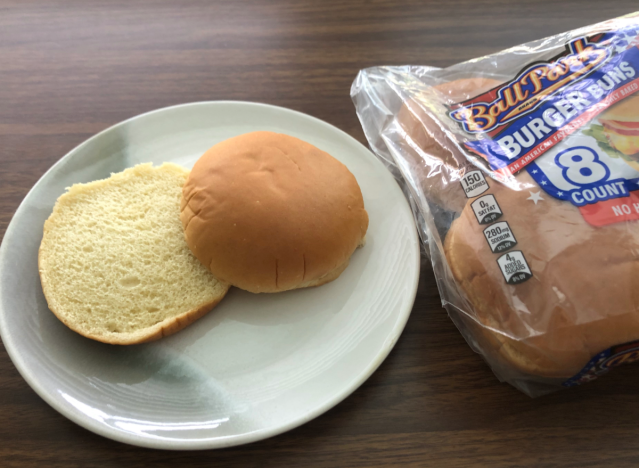
Calories: 140
Fat: 2 g (Saturated Fat: 0 g)
Sodium: 260 mg
Carbs: 27 g (Fiber: 1 g, Sugar: 3 g)
Protein: 4 g
When you want all of the tastes and sensations of the baseball game served up in your own backyard, Ball Park has you covered. The brand produces multiple ready-to-eat hot dog styles, frozen burger patties, and buns and rolls to serve them. All you have to do is have your favorite condiments handy. The Ball Park standard white hamburger buns come in a standard 8-pack size and cost an average price of $3.79.
The look: As expected, the packaging is splattered with American patriotism. Red, white, and blue are the colors of choice, and there is no shortage of decorative stars–paying homage to the country's favorite pastime but simultaneously screaming Fourth of July. A bit flat and pale, the bun itself is much less snazzy and memorable.
The taste: It offers a fleeting trace of sweetness while also proving to be thicker and more robust than it lets on. That's around where the pros end, however. Aside from these high points, it really just boils down to a no-frills piece of white bread. Surrounded by all the excitement and electricity of a summertime baseball game, this elementary choice may just hit the spot.
Pepperidge Farm Sesame-Topped Hamburger Buns
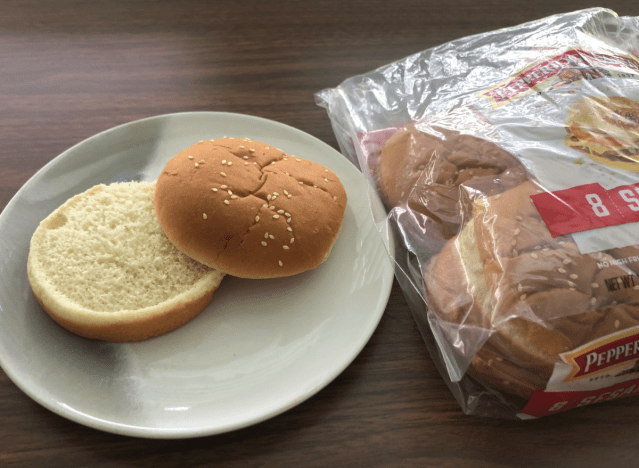
Calories: 150
Fat: 2 g (Saturated Fat: 0.5 g)
Sodium: 230 mg
Carbs: 26 g (Fiber: 1 g, Sugar: 5 g)
Protein: 6 g
You're likely familiar with Pepperidge Farm's work. The baking company gave life to Goldfish Crackers, Milanos, and Farmhouse Cookies, and we can't forget about Swirl bread, which gives breakfast a sweet boost. Of course, the brand also offers bread basics like sliced loaves from wheat to rye and an array of fresh hamburger buns. I grabbed the Sesame-Topped variety to add a little bit of flair to the taste test. The bag of 8 cost me $3.39.
The look: Pepperidge Farm keeps its packaging fairly simple and lets the products speak for themselves. Based on looks alone, these buns give off the impression that they are plump, doughy, and topped with tiny sesame seeds, as promised. The seeds are a bit skimpy, however, almost as if they were added as an afterthought.
The taste: Not bad, but nothing spectacular either. The sesame seeds remind me of a fast-food chain burger bun. And, it tastes like one too, with its nondescript flavor and average strength when topped with a patty or other toppings. It lands squarely in the middle of the pack.
Dave's Killer Burger Buns Done Right
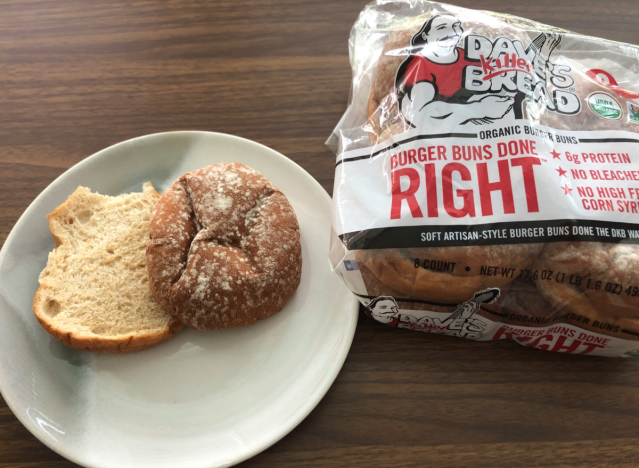
Calories: 140
Fat: 3 g (Saturated Fat: 0 g)
Sodium: 260 mg
Carbs: 32 g (Fiber: 2 g, Sugar: 6 g)
Protein: 6 g
Starting out in 2005, Dave's Killer Bread is a newcomer in the world of store-bought bread. However, in its short time on the market, the brand has certainly made waves and has even earned the title of America's #1 organic bread. According to the founders, the secret to Dave's success is as simple as using non-GMO organic ingredients, plenty of nutritious seeds and grains, and never compromising on taste, texture, and quality. Of course, all of this supposed goodness does come at a price. I paid an astounding $6.99 for an 8-count of the company's Burger Buns Done Right–their words not mine.
The look: Artisanal and wheat-like with a dusting of white flour on top. These are the least symmetrical and perfectly round buns. The bag makes it look more like a nutrition-forward and organic product with specific ingredient callouts and certification stamps.
The taste: Solid and chewy–in a good way. It soaks up the burger juice well and doesn't collapse or crumble. There's an obvious whole wheat flavor in each dense bite. It doesn't taste overly dry and bland, though. All in all, I think it's a good choice if you're looking for an organic product. However, I'm still a little bit hung up on the steep price, and I'm not sure if it's 100% worth it.
Brownberry Potato Buns
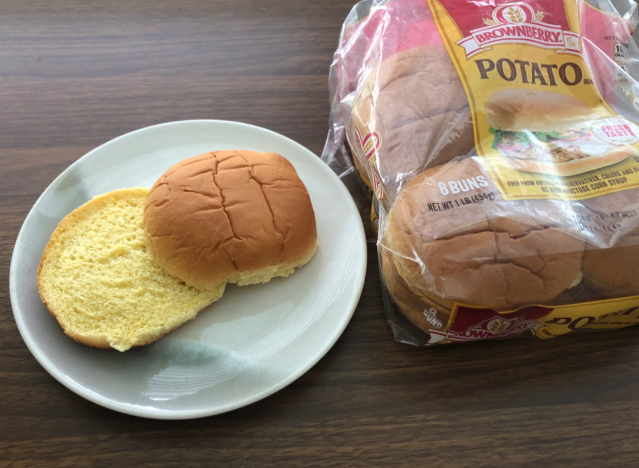
Calories: 160
Fat: 2 g (Saturated Fat: 0 g)
Sodium: 290 mg
Carbs: 30 g (Fiber: 1 g, Sugar: 4 g)
Protein: 5 g
Brownberry is somewhat of a new brand for me. I know it's most often associated with whole grain bread–the kind with oats and seeds scattered throughout and on the exterior. I also know that much of its recent marketing revolves around the fact that it proudly "bakes like grandmas." But I don't believe I have ever added a Brownberry product to my shopping cart until I purchased this pack of Potato buns for $4.49. I know, I know. These don't follow along with the brand's usual whole-grain focus. But they're still supposed to be made with only quality ingredients, sans high fructose corn syrup and artificial preservatives, colors, or flavors. So I did what grandma would do and grabbed them anyway.
The look: Not brown and wheaty like many of Brownberry's other products. Instead, it's drastically yellowed which is standard for a potato bun. Sizewise it leans a little larger than other offerings.
The taste: The resiliency of this bun is something to brag about. It's cushiony enough to squish down around the meat yet thick enough to spring right back up after you set it back down. There's also no fear of it deteriorating under a pile of toppings and condiments. The flavor, though, is what brings it back down to earth in terms of rankings. It has just a touch of sweetness, but nothing else notable, especially compared to some of my favorite buns in this taste test.
Aunt Millie's Stadium White Hamburger Buns
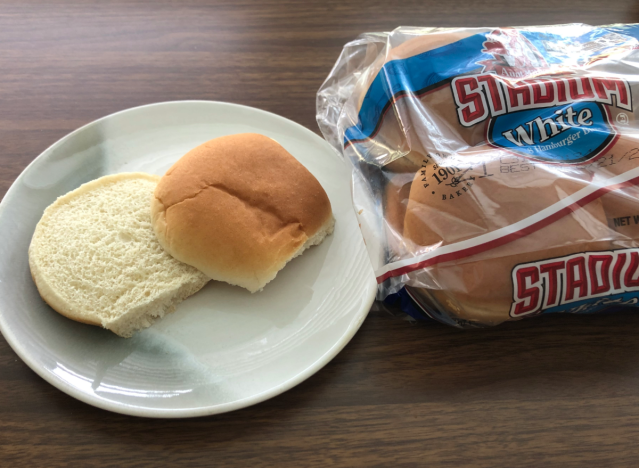
Calories: 140
Fat: 1.5 g (Saturated Fat: 0 g)
Sodium: 240 mg
Carbs: 25 g (Fiber: 1 g, Sugar: 3 g)
Protein: 4 g
Like Sara Lee, Aunt Millie's is another familiar lady of the bread aisle. I bought a bag of her Stadium White Hamburger Buns for $3.29 to pit against other competitors. But there are plenty of other rolls and buns in the brand's lineup that seemed interesting–the Onion Buns sounded particularly inviting. I settled on the Stadium variety because it appears to be the most basic. Plus, I wanted to compare them with Ball Park's product since the two brands are going for the same experience.
The look: A proper-looking bun, fully white at its core with no trace of a yellow tinge. The packaging comes in the nation's colors, like Ball Park's. But it's less in-your-face and more calming in a lighter shade of blue with illustrations of baking tools across the front.
The taste: Light and bouncy. Trying it by itself before throwing a patty into the mix, I was thoroughly impressed by its buttery taste and delicate texture. However, this fragile consistency ultimately became the bun's Achilles heel. It collapsed quickly under the weight of the patty and its juices, leaving behind soggy scraps, especially on the bottom. It's a shame since Aunt Millie's started off so well. Maybe this one is just better suited for lunch meat or something else with a little less bulk.
Wonder Classic Hambuger Buns
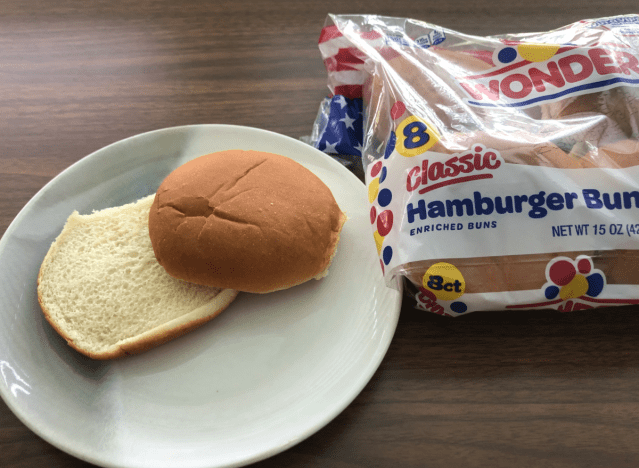
Calories: 150
Fat: 2 g (Saturated Fat: 0.5 g)
Sodium: 310 mg
Carbs: 29 g (Fiber: 0 g, Sugar: 4 g)
Protein: 4 g
Wonder was one of the very first companies to distribute pre-sliced bread back in the 1930s–making it one of the country's most iconic brands. Personally, though, I'm partial to the name because a Wonder Bread factory once operated right here in my city of Columbus, Ohio. As of 2009, it's no longer operational, but the larger-than-life neon sign remains, lighting up the side of one of our busiest highways and serving as a familiar mark of home.
You can still buy Wonder's sliced loaves at nearly any grocery store you visit, as well as its small sampling of other bread-related products, including buns. I found a pack of 8 Classic Hamburger buns for $3.79 at a nearby Kroger.
The look: A bit compact but obviously spongy. Red, blue, and yellow circles float around the bag, and I just learned they are supposed to represent balloons, or more specifically, hot air balloons.
The taste: Not necessarily the best thing since sliced bread, but it's without a doubt a quality choice and top contender. Each bite is incredibly fluffy and airy, with a taste similar to the brand's famous loaves. Unfortunately, this means it has a tendency to stick to the roof of your mouth the same way white bread does. But the product's softness and obvious freshness make up for this phenomenon tenfold. The Wonder Bread bun was also able to beat out Aunt Millie's in terms of durability despite its distressfully flat bottom layer.
Nature's Own Brioche-Style Hamburger Buns
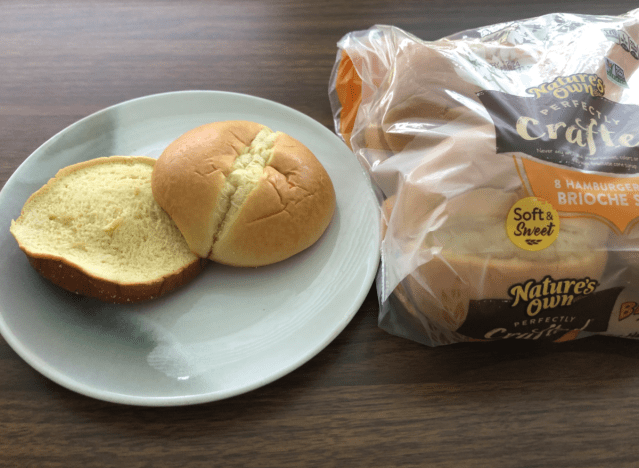
Calories: 170
Fat: 2.5 g (Saturated Fat: 1 g)
Sodium: 270 mg
Carbs: 32 g (Fiber: 1 g, Sugar: 7 g)
Protein: 6 g
Nature's Own is one of America's leading bread brands, known for using wholesome ingredients and always leaving out high-fructose corn syrup and artificial preservatives, colors, and flavors. It sounds like the company is doing something right. But, do the brand's other products, like hamburger buns, live up to the hype of its signature soft breads? I picked up an 8-pack of its Brioche-Style Hamburger Buns for $4.49 to find out.
The look: Not as yellow as Brownberry's potato buns. Instead, it's a soft honey color with an artisanal-looking scoring at the top. Tremendously concentrated and thickset, I knew it would be unyielding.
The taste: Tender despite its dense nature. It's also rich and delivers that sweet brioche taste that Sara Lee's product failed to provide–presumably those 7 extra grams of sugar at work. With just a hint of butteriness as well, I was hooked. It's a near-perfect bun that would pair well with just about anything without eclipsing its flavor.
King's Hawaiian
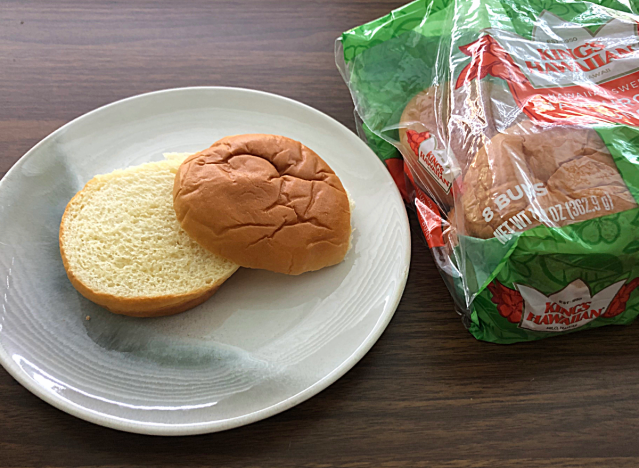
Calories: 140
Fat: 3.5 g (Saturated Fat: 2 g)
Sodium: 120 mg
Carbs: 23 g (Fiber: 1 g, Sugar: 8 g)
Protein: 4 g
Say Aloha to King's Hawaiian. Originally founded in Hawaii in 1950, the family-owned bakery is now based in Los Angeles and doles out a wide selection of bread products, including its famed sweet rolls. These small dough pillows are highly revered in my family and often used to make ham and cheese sliders on football Sundays or any time we're looking to feed a crowd. The brand's hamburger buns, however, are a newer revelation, and I knew they deserved a spot on my list. I found them in my Kroger's bakery section rather than the bread aisle and a normal 8-count cost me $4.99.
The look: Larger than the King's Hawaiian rolls but on the small end of hamburger buns. The coloring and look though is a nearly dead ringer for the brand's rolls with a golden brown exterior and fluffy white center.
The taste: Sweet and buttery with a melt-in-your-mouth consistency. It is somehow firm yet soft simultaneously and became my favorite before I even swallowed my first bite. I don't even think I need condiments or other garnishes to eat a burger on this bun. I could honestly eat it all by itself, just like I do the rolls. If you've been holding out on giving the King's Hawaiian hamburger buns a try, like I was, I'm telling you right now it's worth it and certainly not a purchase you will regret.









